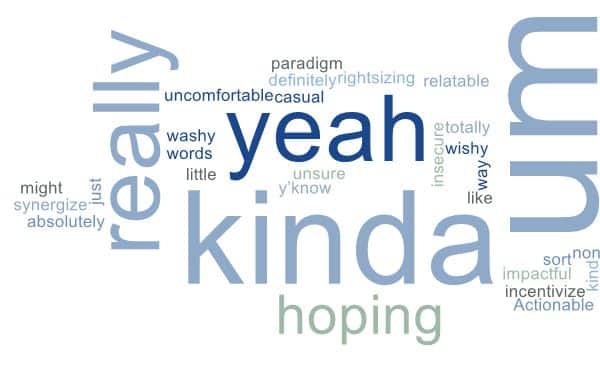When I was a first-year graduate student, I was fortunate to have a scholarly paper accepted for presentation at an important professional conference. It was my first time delivering my young work and it went well. Or so I thought.
In my opening remarks, I announced to a roomful of classmates, mentors, and senior professors that my topic was “not only timely, but of tantamount importance.” Afterward, a senior classmate congratulated me, then whispered, “I think you meant to say ‘paramount importance.’ ‘Tantamount’ means ‘the same.’” Ouch.
That one misspoken word didn’t sink my credibility—though it felt like it had—and one minor misstep won’t sink yours either. But some words, when used too often, can seriously damage how others perceive you. Which words?

There are the obvious verbal fillers such as “like,” “um,” “yeah,” and “y’know”: nonwords used to fill uncomfortable silences or stall while searching for the next thought. Uttered excessively, they create the impression of an unsure, insecure, or overly casual communicator.
But less obvious words and phrases can have an even greater negative impact on credibility. Here are some ethos-busters you’ll definitely want to avoid.
Hedge words
Words and phrases like “sort of,” “might,” and “in a way” undermine direct communication by giving the impression that you’re hedging your bets or are unsure of what you’re saying. “We’re hearing many business presenters say ‘kind of’ or ‘kinda,’” say Dale Ludwig and Greg Owen-Boger of Turpin Communication in Chicago. “As in, ‘We’re kinda going to cover the following agenda items,’ or ‘So you can kinda see that we grew sales.’ That one word undermines credibility and makes the presenter seem wishy-washy. Either you did grow sales or you didn’t.”
Mini-me
Inserting modifiers such as “just” or “a little” or “only” diminishes the importance of what you’re saying. More critically, it chips away at credibility by suggesting subordination or deference, as if you’re asking permission. “Just a little something I was thinking” or “I’m just following up” is far less direct and confident than “Something I was thinking” or “I’m following up.” Ludwig and Owen-Boger report how “Mini-me” speech especially hurts speakers who are trying to be persuasive: “When presenters state their recommendation to an audience, many times they’ll say something like ‘I’m hoping that when we’re done, you’ll see the benefit …’ It’s the ‘I’m hoping’ that undermines their persuasiveness and credibility. We advise being more direct and confident: ‘When we’re done, you’ll see the benefit …’”
Buzzwords and clichés
When everyone is wearing the latest fashion, no one looks original. It’s the same with words. Relying on buzzwords like “best-in-class,” “mission-critical,” and “new normal,” may make you feel as if you’re sounding more businesslike, but the words actually demonstrate a lack of imagination. “The ones I love to hate the most are ‘impactful,’ ‘relatable,’ and ‘incentivize,’” says Dr. Joanne Gilbert, Professor of Communication and New Media Studies at Alma College. “Using this kind of clichéd corporate-speak shows a lack of creativity.” Presentation coach Sally Koering Zimney of This Moved Me agrees. “What I get from someone who uses buzzwords is only a general meaning, one that sounds like everyone else who’s using that word. Plus, I assume they haven’t put much effort into their work. Definitely not credibility-building.”
Overemphasis
If everything is deemed important, nothing is. Words like “absolutely,” “totally,” “definitely,” and “really,” while meant to emphasize a point, can actually have the opposite effect when overused. They can also damage credibility by causing your audience to wonder what the “absolute success” in your quarterly report really was.
What can you do?
So how do you scrub these detrimental words and phrases from your speech? Here are five easy steps:
- Assess: Record yourself in conversation or presentation, or ask a colleague to listen for specific words or phrases when you speak.
- Listen: Be aware of how people around you avoid these words (or don’t).
- List alternatives: Make a list of words or phrases you might use instead of the offenders. Consult a thesaurus.
- Slow down: You may need to speak a bit more intentionally as you self-monitor and correct your habits.
- Be patient and forgiving. It may take a little time to correct yourself, but it will happen. And one flub does not mean the end of the world.
Your credibility is comprised of many things: the reputation you’ve built, the way you engage and interact with others, and how you demonstrate trustworthiness, honesty, and empathy. It’d be a shame to let one little word diminish the good credibility-building you’re doing. I hope you agree: the importance of being aware of language choices is paramount.

